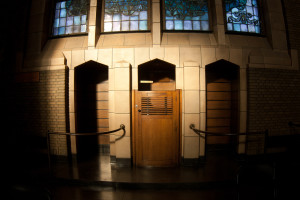by Fr. Keith Branson, C.PP.S., Publications Editor
 It was a chilly January afternoon when I pulled into Beth Heidler’s driveway in Warrensburg, MO, and I was grateful she agreed to a visit on the subject of Confession. I didn’t know Beth well before then, however with 30 years experience in ministry and a profound reputation for a person of deep faith, I was eager to hear what she had to say. Our long conversation was a true gift, a chance to grow in wisdom and understanding.
It was a chilly January afternoon when I pulled into Beth Heidler’s driveway in Warrensburg, MO, and I was grateful she agreed to a visit on the subject of Confession. I didn’t know Beth well before then, however with 30 years experience in ministry and a profound reputation for a person of deep faith, I was eager to hear what she had to say. Our long conversation was a true gift, a chance to grow in wisdom and understanding.
Beth has a long background in ministry: she’s spent over 30 years in parish ministry, raised a family, shared spiritual friendships with many religious, been a voracious reader of many spiritual writers and been part of 12-step programs for a long time. She and her second husband Joe were in a happy marriage for 23 years, and both Precious Blood Companions. She did a lot of preparation for our conversation, talking to many of her older friends and gathering their thoughts as well as preparing her own. The first quote she gave me was from her friend Monica, who said: “Reconciliation is the best thing the Church has going for it…of course, I don’t use it anymore, but I love it.”
Memories about Confession from her childhood were similar to other Cradle Catholics of her generation I’ve talked with. There were horror stories the kids passed around, and a frequent threat was: “You’ll have to go to Confession to (the tough priest.)” The nuns of her generation who taught in Catholic schools weren’t given formal training in theology, everything came from the priests they served with, which was of highly variable quality. Beth observed: “The Baltimore Catechism had a lot going for it, but theology wasn’t one of them.” There seemed to be more mortal sins when she was growing up, sins that usually don’t appear in instructions today. The most difficult thing was that no questions were allowed in religion class—and Beth said her hand was always up anyway.
As a young adult, the biggest struggle was the belief that the priest in the Confessional was guided by the Holy Spirit, and therefore could never give bad advice. As such, her observation during this part of her life was the sacrament was “not what I wanted it to be…” Her family life was exceptionally stressful during this time, and she frequently found herself confessing that she yelled at her kids, yet she never seemed to receive the strength not to do it again as the teaching of the time promised. Many priests in her experience did not treat women as intelligent people, and their own issues and prejudices, even their voyeurism, frequently colored the advice they gave as many things confessed were collapsed into the subject of sex. In summary, she said, “What I was taught was far worse than what I was doing.”
However, Beth’s attitude toward Confession was not dismissive, and she sees the value of the sacrament in the larger context of Reconciliation. The issues that troubled her were with individual confessors and not the sacrament itself. Reconciliation isn’t something we can do on our own; we need someone else to be authentic enough with ourselves and God.
Beth shared a favorite quote of hers from the book Reconciling All Things: A Christian Vision for Peace, Justice and Healing by Emmanuel Katogote and Chris Rice: “Reconciliation is not the sum total of our work, but it is also the particular gift we learn to receive as we live into the story of God’s People.” She reminded me of the journey of God’s people in both the Old and New Testaments: they always strayed, but God always brought them back. God’s mercy is what is at the core of reconciliation, and she told me of some experiences she had in the sacrament that were very positive, especially a priest in a small town who had the courage to tell her that it wasn’t a sin to disobey her abusive first husband. The journey of the sacrament and reconciliation as a whole is that it’s about our opening up as God opens up to us.
Another quote from this book also struck Beth as a good description of the journey of Reconciliation and Confession: “A Christian vision of Reconciliation needs a theological foundation, more than that, however, the term ‘beyond’ reminds us that Reconciliation is a journey beyond our own vision, beyond human actors, strategies and programs. God’s desire and vision is beyond our desire and vision.” Reconciliation as entry into God’s story leads us into something more than remaining in our own failings and sin. Our own sin tends to bury us in ourselves, our own desires and priorities; Reconciliation is about a transcendent encounter that leads us away from being stuck in ourselves and our faults as it heals us.
To be continued in the July issue of The New Wine Press.
